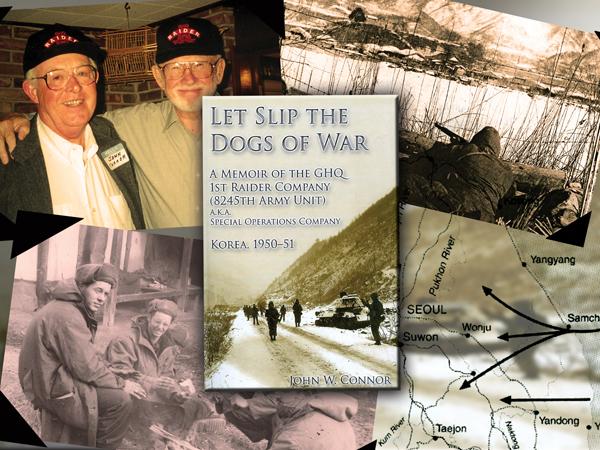The ?forgotten war? no more

connor:Top left: John Connor and Jamie Lee are reunited nearly 50 years after their time spent in the GHQ Raider Company. Top right: Connor returns fire of communist guerillas in Chang-To. Bottom left: Connor, on left, sits around the fire with Lee and fellow Raiders in North Korea in 1951. :Courtesy Photos. Graphic Matt Erickson
February 3, 2010
John Connor, Sacramento State professor emeritus of anthropology and once a hardened Korean War commando, has written a book on his experiences during the war.
“Let Slip the Dogs of War” chronicles Connor’s and his comrades’ lives and battles during the “forgotten war.”
“Most people don’t know about it, but it was (an) unbelievably brutal war,” Connor said.
Connor wrote the book to honor the men he served with.
“It’s a remarkable group of people,” he said.
Connor was part of an elite fighting force called the Raiders, responsible for conducting raids behind enemy lines on the Korean coast and blowing up bridges and tunnels.
His wife, Joan Connor, said she was shocked when she found out he was a commando in the Korean War.
“He seems rather gentle,” Joan said. “I just couldn’t believe he went around blowing up railroads and tunnels.”
Before the war, Connor was stationed in Japan on occupation duty after World War II. He said he fell in love with Japanese culture, sparking his lifelong interest in cultural anthropology.
On June 25, 1950, North Korean forces invaded South Korea with overwhelming force.
Gen. Douglas MacArthur called for a volunteer Provisional Raider Company to conduct raids along the coast of Korea.
Of the 800 men who went through grueling training to test their demolition skills, swimming abilities and intelligence, only 115 made the cut; Connor was one of them.
Connor said he chose to volunteer because he felt an obligation to his fellow servicemen, some of whom were childhood friends.
“It was a matter of honor back then,” Connor said. “There was no way that I could hold my head up high well (while) my childhood buddies were being shot at and killed.”
The Raiders were deployed in rubber boats from a British frigate onto the shores of Kunsan in South Korea.
Many of the boats were destroyed by North Korean gunfire on the shore. Men had to ride 15 to a boat back to the frigate, even though the boats were designed to carry only 10, Connor said. Some had to simply jump into the sea and try to swim back.
After many battles, Connor said he became resigned to death, convinced that none of the Raiders would make it out alive.
“I will tell you that I have never known autumn leaves to be so beautiful, or wood smoke to be so pungent as then,” Connor said. “Every day you wanted to get everything you could out of it because there was no tomorrow.”
When the Raiders were ordered to hold the town of Chang-to in South Korea, they were subjected to more than a dozen “banzai” charges – a tactic of sending waves of men to overcome the enemy – for three and a half days.
“You’d hear the whistles and the bugles, and they would come after us.” Connor said. “Wave after wave of them.”
In the end, they killed more than 400 North Koreans and lost more than a dozen Raiders.
With only about 85 or 95 of the original 115 remaining during the battle, the Raiders received a special commendation for imposing heavy losses on the enemy, Connor said.
While holding open the mountain passes at the Chosin Reservoir, located in North Korea, the temperature dropped to -30 degrees Celsius. Having no heaters, tents or other shelter, the Raiders slept in mountain sleeping bags out in the open.
The freezing temperatures caused bone deformations in Connor’s hands and feet.
Connor went on to become a professor of anthropology. During his 30 years as a professor, he taught courses in Japanese culture and received Fulbright scholarships to do research in Japan.
Elizabeth Strasser, professor of anthropology at Sac State, said he brought the anthropology department much prestige.
“I’m proud to have had him as a colleague, and pleased to have him and his wife as friends,” Strasser said.
Connor is now in his 80s. He must carry a flashlight and special glasses to read, and has neuropathy, a condition that makes the muscles in his legs weak.
The Raiders are being recognized this month as one of the ancestral units of today’s special forces. On Memorial Day, they will be honored at Fort Bragg, N.C.
Connor said they would likely hold their last meeting there, as many of the veterans are now reaching their 80s or older, and meeting becomes harder each year. Connor will be talking about his book at 3 p.m. today in the University Library Petris Room.
Timothy Sandoval can be reached at [email protected].




























































































































